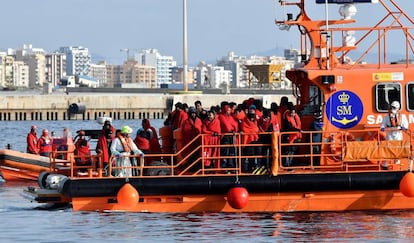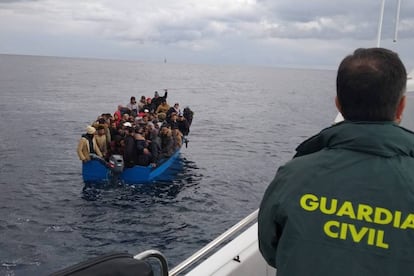Spain and Morocco reach deal to curb irregular migration flows
Sea rescue services will be able to return some migrants to Moroccan ports instead of taking them to Spanish ones

Spain and Morocco have reached an agreement on an unprecedented strategy to contain irregular immigration. Under the deal, Spain’s sea rescue services, Salvamento Marítimo, will be allowed to take some of the rescued migrants back to Moroccan ports, according to three sources in the Spanish government.
The measure will apply to migrants found in missions where Spanish rescue services are assisting the Moroccan Coast Guard in their maritime area of responsibility, and when the nearest port is in Morocco. “Given our good relations with Morocco, Salvamento Marítimo will assist the Moroccan Navy if so required. In that event, rescued individuals will be taken to the nearest safe harbor, which in this case will be Moroccan,” said a government source.
This kind of measure could turn us into someone to avoid
Until now, all migrants found by Spanish rescue services in waters of the Strait of Gibraltar or the westernmost section of the Mediterranean Sea have been automatically taken to Spanish ports, even if the rescue took place nearer the Moroccan coastline.
The measure is part of the Spanish executive’s attempts to reduce migratory pressure at a time when irregular immigration has become an electoral issue as Spaniards head for local, regional, national and European elections. The new guidelines are meant to go into effect immediately, although their future will depend on the outcome of the snap general election called for April 28.
In December, the ruling Socialist Party (PSOE) sustained a stinging defeat in the southern region of Andalusia, where a far-right party named Vox made significant inroads on the promise to crack down on illegal immigration. Vox is now taking its message to other parts of Spain in the hopes of replicating its success.

More from Morocco
Madrid’s plan against irregular immigration also seeks greater involvement by the Moroccan Coast Guard, which only accounts for a small fraction of rescues. Salvamento Marítimo workers routinely complain about lack of action by their Moroccan counterparts.
“It’s happened before that Morocco informs us that they are going out on a rescue mission, but nobody shows up,” said one worker speaking on condition of anonymity, given that Salvamento Marítimo does not allow its employees to speak with the media.
How rescues work
Salvamento Marítimo assists migrant boats in distress when they receive an emergency call on the radio or telephone. The closest coordination center, generally in Almería or Tarifa, locates the vessel and sends the nearest rescue ship.
Often, a Spanish rescue ship will handle emergencies that are technically inside the responsibility area of the Moroccan Coast Guard. The latter has fewer resources and has shown less of a commitment to assist migrants in distress.
The Spanish and Moroccan Search and Rescue areas of responsibility sometimes overlap. The Spanish area comes near Moroccan beaches, making coordination between rescue services from both countries necessary.
Spain feels legitimized to ask Rabat for greater cooperation after Madrid used its clout in the European Union to help release €140 million in European funds to help Morocco enforce migration control.
Out of the 23,135 people who were rescued in the area in 2017, the most recent year available on Salvamento Marítimo’s website, only 4,045 (17%) were assisted by Morocco. Spanish government sources said that Rabat will receive two speedboats, worth around €2 million each, to help improve its rescue record.
Spanish sea rescue workers said that the Moroccan Coast Guard should do more to help people in distress, but were skeptical about sending people back. These sources recalled that they once received an order to send rescued people back to Tangier, and the migrants rebelled against the decision.
“This kind of measure could turn us into someone to avoid. Deaths will rise. They will stay away from anything that smells of repatriation,” said Ismael Furió, spokesman for CGT, the majority union at Salvamento Marítimo.
A tougher attitude
In another change to last year’s welcoming policies, humanitarian rescue ships run by non-profit groups are now being denied departure permits to prevent them from coming back to Spain with migrants that other European countries refuse to accept.
Closed-door policies by countries such as Italy and Malta have diverted migration flows to the Western Mediterranean. Data from Frontex, the European border and Coast Guard agency, shows nearly 57,000 migrants arrived on southern Spanish shores in 2018, twice the figure in Italy and nearly the same to have arrived in Greece. The Spanish Interior Ministry places that figure at upward of 64,000.
Morocco is the main departure point for undocumented migrants going to Spain. At the Strait’s narrowest point, the distance between North Africa and continental Spain is 7.7 nautical miles, around 14 kilometers. Official data shows that nearly nine out of 10 migrants who reached Spanish shores in 2018 were taken there by Spain’s sea rescue services.
English version by Susana Urra.
Tu suscripción se está usando en otro dispositivo
¿Quieres añadir otro usuario a tu suscripción?
Si continúas leyendo en este dispositivo, no se podrá leer en el otro.
FlechaTu suscripción se está usando en otro dispositivo y solo puedes acceder a EL PAÍS desde un dispositivo a la vez.
Si quieres compartir tu cuenta, cambia tu suscripción a la modalidad Premium, así podrás añadir otro usuario. Cada uno accederá con su propia cuenta de email, lo que os permitirá personalizar vuestra experiencia en EL PAÍS.
¿Tienes una suscripción de empresa? Accede aquí para contratar más cuentas.
En el caso de no saber quién está usando tu cuenta, te recomendamos cambiar tu contraseña aquí.
Si decides continuar compartiendo tu cuenta, este mensaje se mostrará en tu dispositivo y en el de la otra persona que está usando tu cuenta de forma indefinida, afectando a tu experiencia de lectura. Puedes consultar aquí los términos y condiciones de la suscripción digital.








































